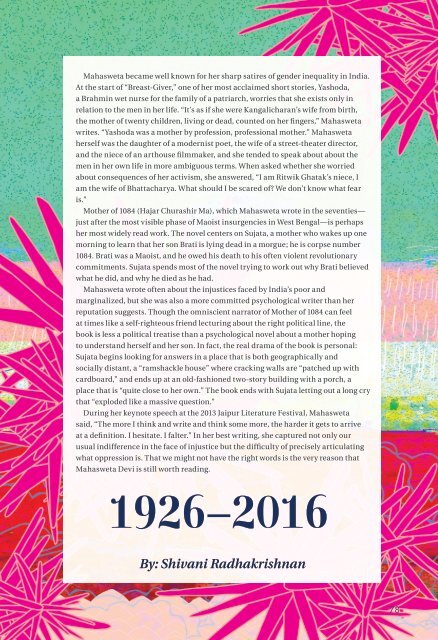magazine_final_online
Create successful ePaper yourself
Turn your PDF publications into a flip-book with our unique Google optimized e-Paper software.
Mahasweta became well known for her sharp satires of gender inequality in India.<br />
At the start of “Breast-Giver,” one of her most acclaimed short stories, Yashoda,<br />
a Brahmin wet nurse for the family of a patriarch, worries that she exists only in<br />
relation to the men in her life. “It’s as if she were Kangalicharan’s wife from birth,<br />
the mother of twenty children, living or dead, counted on her fingers,” Mahasweta<br />
writes. “Yashoda was a mother by profession, professional mother.” Mahasweta<br />
herself was the daughter of a modernist poet, the wife of a street-theater director,<br />
and the niece of an arthouse filmmaker, and she tended to speak about about the<br />
men in her own life in more ambiguous terms. When asked whether she worried<br />
about consequences of her activism, she answered, “I am Ritwik Ghatak’s niece, I<br />
am the wife of Bhattacharya. What should I be scared of? We don’t know what fear<br />
is.”<br />
Mother of 1084 (Hajar Churashir Ma), which Mahasweta wrote in the seventies—<br />
just after the most visible phase of Maoist insurgencies in West Bengal—is perhaps<br />
her most widely read work. The novel centers on Sujata, a mother who wakes up one<br />
morning to learn that her son Brati is lying dead in a morgue; he is corpse number<br />
1084. Brati was a Maoist, and he owed his death to his often violent revolutionary<br />
commitments. Sujata spends most of the novel trying to work out why Brati believed<br />
what he did, and why he died as he had.<br />
Mahasweta wrote often about the injustices faced by India’s poor and<br />
marginalized, but she was also a more committed psychological writer than her<br />
reputation suggests. Though the omniscient narrator of Mother of 1084 can feel<br />
at times like a self-righteous friend lecturing about the right political line, the<br />
book is less a political treatise than a psychological novel about a mother hoping<br />
to understand herself and her son. In fact, the real drama of the book is personal:<br />
Sujata begins looking for answers in a place that is both geographically and<br />
socially distant, a “ramshackle house” where cracking walls are “patched up with<br />
cardboard,” and ends up at an old-fashioned two-story building with a porch, a<br />
place that is “quite close to her own.” The book ends with Sujata letting out a long cry<br />
that “exploded like a massive question.”<br />
During her keynote speech at the 2013 Jaipur Literature Festival, Mahasweta<br />
said, “The more I think and write and think some more, the harder it gets to arrive<br />
at a definition. I hesitate. I falter.” In her best writing, she captured not only our<br />
usual indifference in the face of injustice but the difficulty of precisely articulating<br />
what oppression is. That we might not have the right words is the very reason that<br />
Mahasweta Devi is still worth reading.<br />
1926–2016<br />
By: Shivani Radhakrishnan<br />
78


